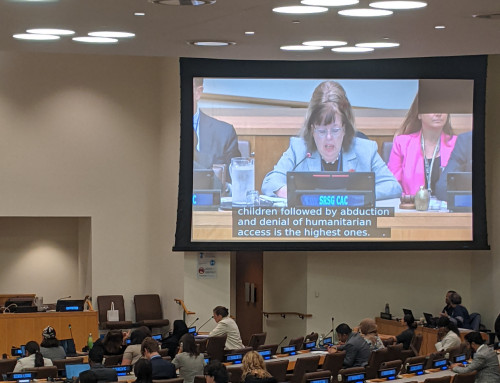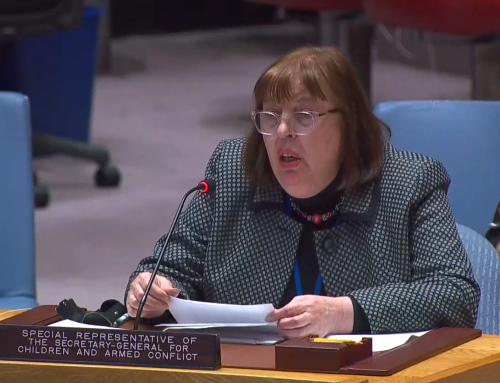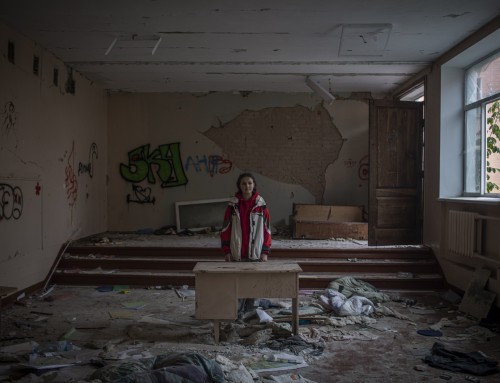World Humanitarian Summit
Side Event
“Strategies for Ending Attacks on Health Workers, Facilities and Patients”
Statement by Ms. Leila Zerrougui,
Special Representative of the Secretary-General
for Children and Armed Conflict
Istanbul, 24 May 2016
Good morning ladies and gentlemen. It is my pleasure to be here with you to share my experience and work regarding the protection of healthcare in times of armed conflict. I would like to thank RedR UK and the Safeguarding Health in Conflict Coalition for inviting me to speak today. The topic of this event is of vital importance for children living in conflict zones.
High-profile attacks on medical facilities have brought attention to the issue in recent months. However, in reality, hospitals, doctors, nurses, ambulances and patients have long since suffered from acts that challenge the most basic principles of the laws of war.
The situations in Syria, Yemen and Afghanistan are perhaps the most emblematic of the challenges we currently face in protecting healthcare.
Today, almost half of all medical facilities in Syria are closed or only partially functioning. I am sure my fellow panelist will elaborate on the difficulty of healthcare workers across Syria, but I wanted to highlight the situation relating to children in one specific city, Aleppo. We are well aware of the recent air strike on the hospital in Aleppo, which reportedly killed more than 50 staff, patients, and nearby civilians. This number includes Muhammad Wassim Mo’az, one of the few pediatricians remaining in the city. The girls and boys of Aleppo face an almost impossible task to obtain basic healthcare and survive the war. As another Syrian doctor (Osama Abo El Ezz) wrote in response to Dr Mo’Az’s death; “[w]hat is most heartbreaking is when we have to choose which patients to save because there aren’t enough doctors to treat everyone. Our hospitals, though they are the targets of bombs, still overflow with the sick and injured.”
In Yemen, the blatant disregard for International Humanitarian Law is unacceptable. To give one example, the United Nation’s monitoring and reporting mechanism on grave violations against children in armed conflict recorded that, in Taiz, three health facilities were hit in 23 separate incidents throughout 2015. This is no military miscalculation. This is no accident. This is the deliberate targeting of buildings set up to shelter the wounded and the sick and thus protected under International Humanitarian Law.
The attack on the Médecins Sans Frontières hospital in Kunduz last October caused the deaths and injuries of 49 medical staff and patients, including at least three children. The hospital was the only fully functioning trauma care facility for the northeastern region of Afghanistan. This destruction by aerial bombardment adds to the strain on healthcare due to long-standing trends, such as attacks on polio workers by the Taliban.
Parties to conflict, some of which are at this Summit, must understand the long-term impact of attacks on healthcare. When a community is recovering from conflict it can take decades to reinstall skilled doctors, nurses, and the physical infrastructure to provide healthcare. Even a short period of hostilities can have a lasting impact.
Ensuring healthy lives and promoting well-being for children is at the heart of the recently adopted Sustainable Development Goals (SDGs) which, if achieved, can have a significant impact on the lives and futures of all children.
We must ensure that the protection of healthcare in conflict is a key element for achieving these goals. A post-conflict country cannot develop and grow without a healthy population. We simply cannot afford attacks against hospitals and medical personnel, particularly in situations where health care systems are already fragile.
Ladies and gentlemen,
Governments bear the primary responsibility for protecting civilians. They must adopt clear legislation and issue command orders to their security forces to protect hospitals, doctors and patients. Precautionary measures for military operations must be put in place. These may include joint military-civilian assessments of the security risk for populations and protected institutions prior to any military action; or refraining from engaging in combat and/or using heavy artillery in populated areas.
Most pressing is that all crimes must be investigated promptly and effectively, and prosecutions pursued. Ending impunity for attacks on healthcare is the best way to prevent their recurrence.
The international community and, in particular the UN Security Council, also has an important role to play in promoting accountability, protection and prevention. In resolution 2286 (2016) the Council demanded that all parties to armed conflict comply fully with their obligations under international law, in particular their obligations under the Geneva Conventions of 1949 and their Additional Protocols of 1977 and 2005. However, this resolution is silent regarding the mechanism to monitor compliance with these obligations.
Such a mechanism was put in place ten years ago. Through a number of resolutions, the Security Council gave the United Nations tools to monitor and report on grave violations against children in conflict, including attacks on hospitals, schools and protected personnel. Five years ago, in resolution 1998, the Council went further and asked the United Nations to list parties to conflict that attack hospitals, schools and protected personnel. The information collated by my office is provided to the Council as part of our efforts to stop violations against children and to inform action.
To support these efforts and implement Security Council resolution 1998, my Office, together with UN partners including UNICEF, WHO, and UNESCO, created a guidance note to facilitate and strengthen monitoring and reporting by partners in the field. The guidance note, which is available in Arabic, English and French, provides key definitions and practical advice; it is also a tool that promotes advocacy and dialogue with parties to conflict, as well as aiming to increase partnerships between various stakeholders.
I cannot emphasize enough that the primary responsibility in upholding International Humanitarian Law lies with parties to conflict. The United Nations can support such efforts, but cannot make up for the lack of political will to comply with obligations under International Law. Tomorrow morning, at the High-Level Roundtable on Upholding the Norms that Safeguard Humanity, Member States will commit to promote and enhance efforts to respect and protect medical personnel, transports and facilities.
This needs to be followed up with clear and concrete action. International law regarding this topic is well established – there is no questioning its logic or its necessity. But we need practical action by parties to conflict to prevent attacks, not rhetoric.
Ladies and gentlemen,
This is just a short overview of the challenges we face in protecting healthcare. The challenges require that we use this Summit to engender a greater respect for international law, which is a main component of the Secretary-General’s agenda for humanity. Without respecting the principles that have been agreed to govern mankind’s most brutal acts, children cannot be spared the consequences of the decisions of their political leaders. The health of girls and boys should not suffer because adults choose to start a war.
I would welcome your comments and questions if we have time.





